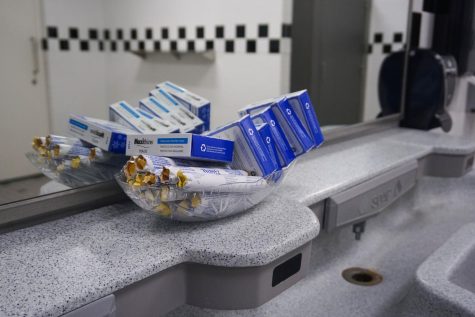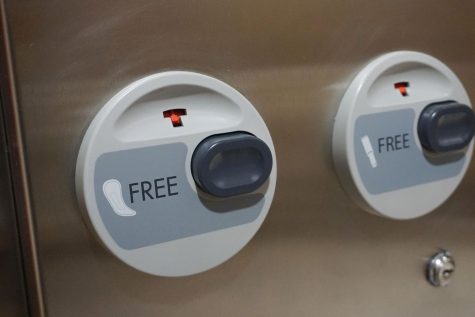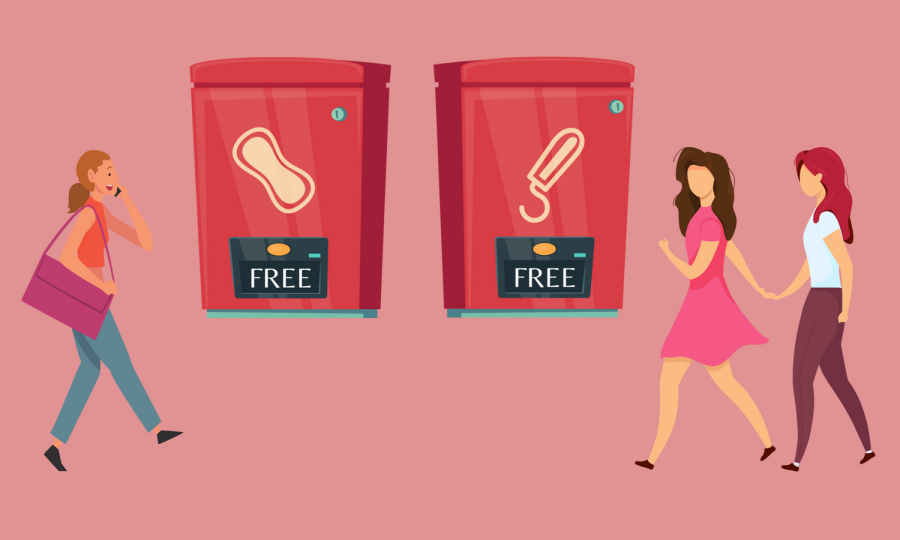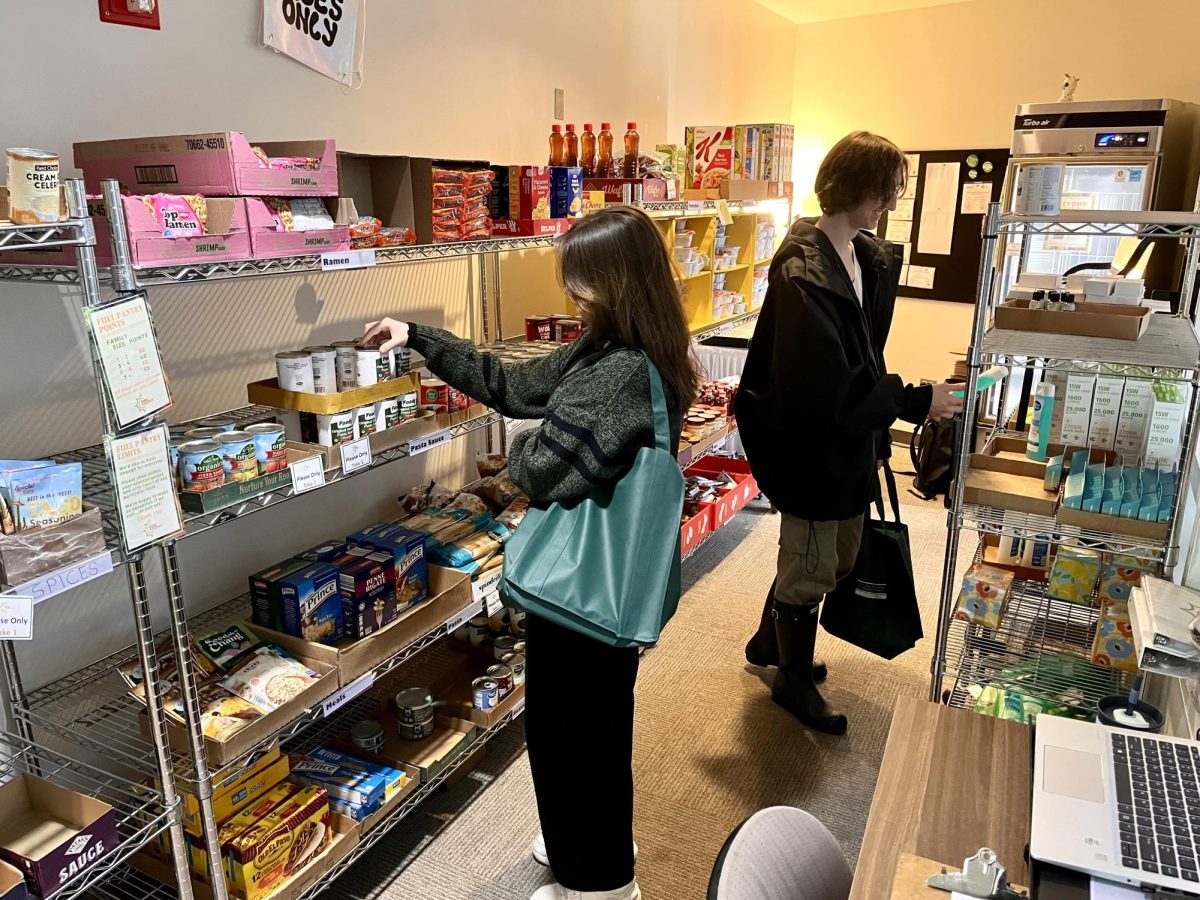Free Pads and Tampons on Campus
Due to Illinois state law, menstrual hygiene products are being provided for free in college bathrooms.
October 17, 2022
For students on their periods, lack of access to menstrual hygiene products can change the course of the day. Illinois public schools and colleges are taking steps to prevent that, and College of DuPage students are starting to take notice.
In August 2021, COD’s custodial staff was notified of the passing of Illinois House Bill 641, which required all public universities and colleges to provide free menstrual hygiene products in campus bathrooms. This bill was focused on recognizing these products as necessities and making them more accessible to those struggling to afford them. It acted as an extension to a bill passed in 2017 which required the same thing in the bathrooms of public schools serving grades 6-12.
“Our custodial staff started working on it right away,” said Custodial Manager Monica Chowaniec.
The department faced the issue of updating the campus’s several pad and tampon dispensers that required payment to dispense products. New dispensers would cost $600 each. Supervisor of Custodial Operations Chris Peretti found that the existing dispensers could be converted to not require payment, but each of the six different models present on campus would require a unique conversion kit. Peretti ordered these kits and worked on converting all the campus dispensers, including those in COD’s Addison, Carol Stream, Westmont and Naperville locations.
In the meantime, menstrual hygiene products were placed on top of dispensers, and tape was used to cover the price labels and indicate that products were free to use. Chowaniec also had the idea to use open trays for the staff to place pads and tampons in unisex bathrooms and bathrooms that did not yet have dispensers, as the new payment-free dispensers are on backorder.

Student Mariana Quezada noticed these trays in the Summer 2022 semester.
“I was very grateful, because that’s one less expense for me, and I know other people don’t have access to those sanitary items, especially tampons,” Quezada said.
Hafsa Ali, a sophomore at Benedictine University, saw one of these trays during her regular study sessions at the COD campus.
“I love the fact that COD has pads and tampons openly available for free. Most other bathrooms have the machine thing that you have to pay for,” Ali said.
The products came in handy for first-year student Sophia Cooper.
“I actually had to use one last week, because I thought I was done with my cycle, but I realized I was still spotting,” Cooper said. She recounted an experience in a restaurant when, after disposing of her used tampon, she realized she had no other sanitary products with her.
“I had to roll up some toilet paper and hope for the best,” she said.
Upon learning about House Bill 641, Cooper said, “I think it’s the best thing ever. Sanitary products should be available. We didn’t choose this life, it chose us.”
Student Naaila Quadri recalled getting her period in high school during the swim unit in gym class. She didn’t have coins on her to use the dispenser that she was skeptical of, as it looked unkept.
“It had a loose tampon sticking out,” she said. “I ended up sitting out.”
About the free products Quadri said, “I think it’s great! It definitely needs to be more accessible.”
A 2021 BioMed Central article found that 14.2% of sampled university students were not able to afford menstrual hygiene products in the past year. House Bill 641 isn’t the only recent measure being taken to combat this issue. Also signed by Governor J.B. Pritzker was a bill requiring the Illinois Department of Human Services (IDHS) to apply for a waiver that will begin the process of making diapers and menstrual hygiene products eligible for the Supplemental Nutrition Assistance Program (SNAP) and the Special Supplemental Nutrition Program for Women, Infants and Children (WIC). A third bill was signed requiring certain homeless shelters to provide these products if permitted by their budget.
Over the past 10 years an increasing number of companies have also introduced reusable menstrual hygiene products such as period underwear, cups and machine-washable pads and liners. These don’t only have the potential to save users money over time, but they also create less waste than single-use products.
Some retailers are taking measures as well. On Oct. 12 CVS Pharmacy announced a 25% price reduction on CVS Health and Live Better tampons, pads, cups and liners. CVS is also paying the sales tax on behalf of customers for these products in some states where it is charged.
Chowaniec anticipates eventually seeing an effect on COD’s facilities budget due to the free distribution of menstrual hygiene products as in-person student numbers recover from the COVID-19 pandemic. However, she says she will ensure that enough money is allocated to always keep the bathrooms well-stocked.

“There was talk that tampons were, like paper towels, toilet paper and wipes during COVID, going to run out. I made sure I ordered enough. I don’t think that it should be too much of a problem,” Chowaniec said. “It’s very nice that this law came into effect and we’re providing this. This is just like toilet paper and paper towels. It’s important to have.”
Over time, free dispensers will be present in every COD women’s and unisex bathroom. Until then the custodial staff will continue to keep menstrual hygiene products stocked, accessible and free.




















